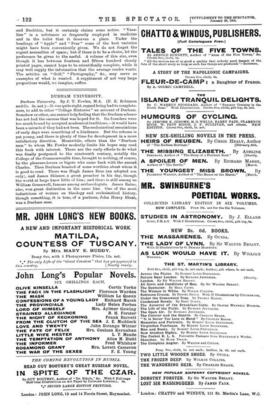Durham University. By J. T. Fowler, M.A. (F. E. Robinson
and Co. 5s. net.)—It was quite right, regard being had to complete- ness, to add to other " College Histories " an account of Durham. Somehow or other, one cannot help feeling that the Durham scheme has not had the success that was hoped for it. Its founders were too much bound by accepted academical traditions,—it would have been a miracle if they had not been. The ecclesiastical associations of early days were something of a hindrance. But the scheme is yet young, and there is plenty of time for development in a more satisfactory direction. Meanwhile, others than the "Durham men " to whom Mr. Fowler modestly limits his hopes may read this book with interest. There are the early efforts to do what was finally postponed to the nineteenth century, notably the College of the Commonwealth time, brought to nothing, of course, by the pleasure-lovers or bigots who came back with the second Charles. Then Durham boasted of some worthies about whom it is good to road. There was Hugh James Rose (an adopted son enly, and James Skinner, a great preacher in his day, though the world at large knew little of him ; and then) is still among us William Greenwell, famous among archaeologists. James Raiue, also, won great distinction in the same line. One of the most industrious of writers on theology and ecclesiastical history, though something, it is true, of a partisan, John Henry Blunt, was a Durham man.






















































 Previous page
Previous page